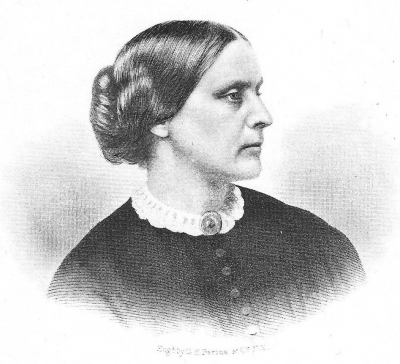Leavenworth Resident Starts Nationwide Civil Rights Campaign
By Bernadette Cahill
In 1865, Leavenworth welcomed a prominent temporary resident in Susan B. Anthony. The Civil War still raged, but Congress had just passed the 13th Amendment and as she arrived here at the end of January, it was sent to the States for ratification. This was completed the next December.
Anthony and Elizabeth Cady Stanton had played a major part in this Amendment. Protesting the inadequacy of President Lincoln’s 1863 Emancipation Proclamation, the two had created a National Woman’s Loyal League and produced a “mammoth petition” for legislation to abolish slavery in the United States. The signatures that they gathered, with little male support, inspired some congressmen to begin promoting an abolition amendment instead. Anthony and Stanton’s war work, for the moment, was done.
Anthony came to Leavenworth at that point because, like all “old maids,” she was useful during her sister-in-law’s pregnancy and she had nothing pressing to do.
At the time, Anthony’s brother Daniel owned the Leavenworth Bulletin. Soon an editor in the family business, when Daniel was re-nominated for Mayor, Anthony quickly complained she was not allowed to report on the rights of black people or women, for her brother backed away from controversy. Nevertheless, she organized black refugees flooding into the state into an Equal Rights League.
In these circumstances, and receiving letters from back east, Anthony could easily keep abreast of the latest news. And soon after the War ended and the President died, when controversy had begun to rage about the rights of freed slaves, she heard in early May that Wendell Phillips, the most incendiary of the abolitionists and now new head of the American Anti-Slavery Society, had declared:
I want to have another amendment passed which shall read thus: no State shall at any time make a distinction of civil privileges between the children of parents living on or born on her soil, either of race, condition or color…
All in favor of this, the rest of the announcement made Anthony’s blood run cold:
I hope some day to be bold enough to add “sex.” However … we must take up but one question at a time, and this hour belongs exclusively to the negro.
“This is the Negro’s hour” became the war-cry of post-war abolitionists and official Republican policy, and the men deliberately ignored rights for women, cut them out of debate and tried to silence them.
Anthony was having none of it. As a prominent Abolitionist, she was invited to give an Independence Day speech in Ottumwa – 100 miles or so to the southwest. Obligingly, she spoke primarily about enfranchising black men. But near the end, she declared:
When I speak of the inalienable rights of the negro, I do not forget that these belong equally to woman. Though the government shall be reconstructed on … universal manhood suffrage, it yet will not be a true republic. Still one-half of the people will be in subjection to the other half, and the time will surely come when the whole question will have to be reopened and an accounting made with this other subject class. There will have to be virtually another reconstruction, based on the duty of the national government to guarantee to every citizen the right of self-protection, and this right, for woman as for man, is vested in the ballot.[1]
These were fighting words. Delivered in Ottumwa when Anthony was resident in Leavenworth, they seem to be the first time that anyone had declared so publicly that women were not going to take lying down the half measures of the “Negro’s hour.”
If they did so, women would have to submit to being overtly excluded from the right to vote. Equally important, congressmen were already discussing the 14th Amendment to tackle the legal impact of the 13th. There was no time to lose.
Anthony proposed to follow up on her Ottumwa message when she spoke about civil rights here in Leavenworth that August1.[2] Local Republicans, however, banned that part of it. They also fought against her wish to print her reference to women when she published her speech. In the United States in 1865, women did not count.
Anthony complied at least when speaking. But she did not cave. Stanton had warned her about the anti-woman political sentiment back east. That month she learned the word “male” in the new amendment would determine the right to vote. Its first appearance in the Constitution would exclude women from civil rights.
Anguished by this betrayal, soon after her speech in Leavenworth, Anthony was heading east, paying her way home in a speaking tour for the National Anti-Slavery Standard newspaper by advocating black male suffrage only.
It was the last time she talked of the rights of men without the rights of women. That December, she and Stanton officially launched a campaign to keep the word “male” out of the post-war Amendments. It would include a bitter – but lost – fight here in Kansas in 1867 to enfranchise black men and all women by state referenda.
By 1870, the women’s courageous but small, underfinanced, minority campaign pitted against the mighty Republicans and male abolitionists, had failed. While Kansas women won state voting rights in 1912, it would take women more than 500 separate campaigns until 1920 to win nationally what the 14th and 15th Amendments gave former slaves and free black men within five years of Appomatox, ensuring that only men had a say in government.
That women’s revolution began when a temporary resident of Leavenworth, speaking in Ottumwa on July 4, 1865, rocked the boat and launched the campaign across the nation to end discrimination in voting against women.
[1]Ida Husted Harper, The Life and Work of Susan B. Anthony, (Indianapolis & Kansas City: Bowen-Merrill Company, 1899,) II, 966.
[2]Ibid, I, Ida Husted Harper, I, 247.



